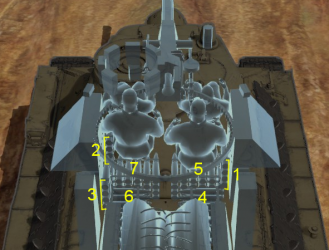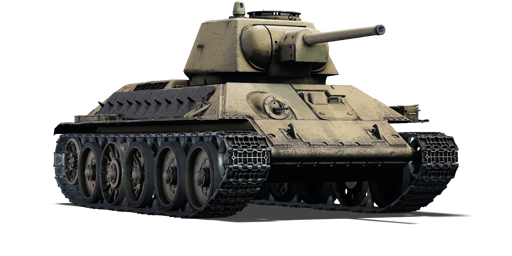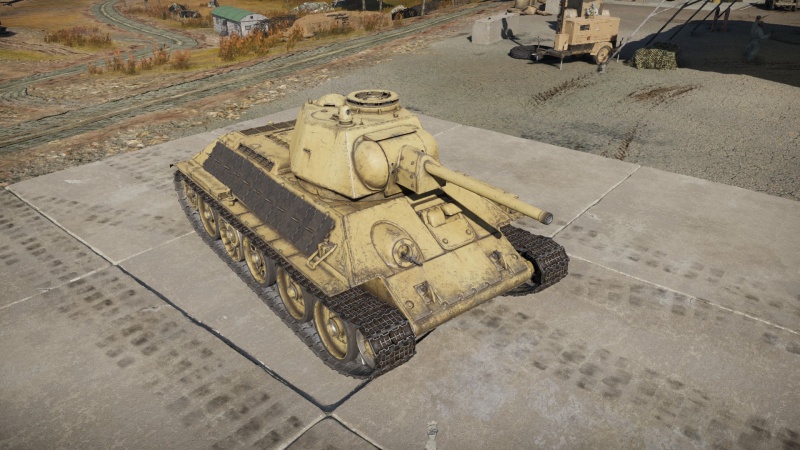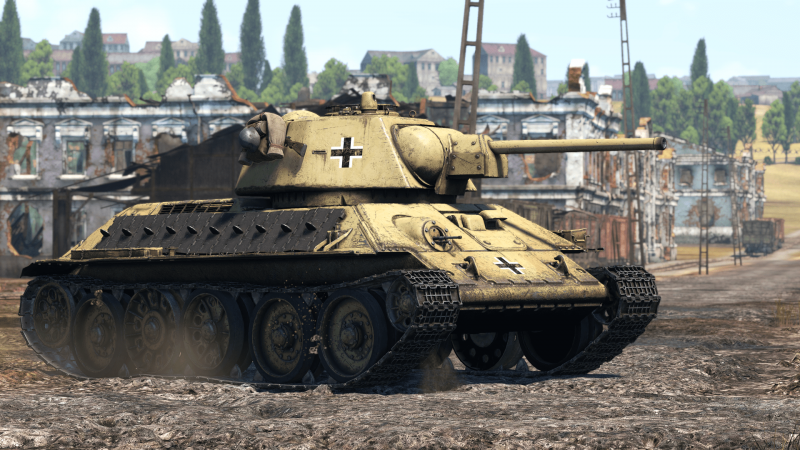Difference between revisions of "T 34 747 (r) (Germany)"
(→Pros and cons) (Tag: Visual edit) |
Colok76286 (talk | contribs) |
||
| Line 153: | Line 153: | ||
* Limited gun depression of -5° | * Limited gun depression of -5° | ||
* The crew members in the tank are cramped, any shot that penetrates has a high chance of knocking them out | * The crew members in the tank are cramped, any shot that penetrates has a high chance of knocking them out | ||
| − | |||
== History == | == History == | ||
Revision as of 01:46, 3 October 2023
| This page is about the premium medium tank T 34 747 (r) (Germany). For other versions, see T-34 (Family). |
Contents
Description
The ▀Pz.Kpfw. T 34 747 (r) is a premium rank III German medium tank with a battle rating of 4.3 (AB/RB/SB). It was introduced in Update 1.59 "Flaming Arrows".
This captured version of T-34 (1942) is a Soviet T-34-76 modified with additional appliqué armour on the front and removed forward mudguards. There are few cosmetic changes to the turret: the significant improvement is the commander's cupola and few minor changes, but it still plays the same as the Soviet T-34 (1942). The "(r)" in the designation stands for "russisch", indicating a Soviet-captured vehicle.
General info
Survivability and armour
The T 34 747 (r) has an armour profile that is a combination of the T-34 (1942) and the T-34E STZ, due to the hexagonal turret's 53 mm thickness and the added-on 15 mm plate to the front hull plate. The addition of 20 mm track armour on the side hull also provide significant side protection against glancing incoming shots.
Beyond the armour profile however, the ability of the T 34 747 (r) to survive a penetrating AP round is rather low. With the ammunition, fuel, and the crew condensed to the front half of the tank, a penetrating shot will likely cripple or outright destroy the tank.
Armour type:
- Rolled homogeneous armour (Hull, Gun mantlet, Turret roof, Cupola)
- Cast homogeneous armour (Turret, Machine gun port, Driver port)
| Armour | Front (Slope angle) | Sides | Rear | Roof |
|---|---|---|---|---|
| Hull | 45 + 15 mm (60°) Front glacis 99 mm (13-53°) Armour joint 45 + 15 mm (60°) Lower glacis |
40 + 20 mm (39-41°) Top 45 mm (0-2°) Bottom |
40 mm (7-48°) Top 40 mm (11-45°) Bottom |
16 mm 10 mm Engine grille cover |
| Turret | 53 mm (2-28°) Turret front 45 mm (0-65°) Gun mantlet |
53 mm (0-21°) | 53 mm (19-29°) | 15 mm |
| Cupola | 53 mm (9°) | 53 mm (9°) | 53 mm (9°) | 15 mm |
Notes:
- Tracks and suspension wheels has a thickness of 20 mm.
Mobility
| Game Mode | Max Speed (km/h) | Weight (tons) | Engine power (horsepower) | Power-to-weight ratio (hp/ton) | |||
|---|---|---|---|---|---|---|---|
| Forward | Reverse | Stock | Upgraded | Stock | Upgraded | ||
| Arcade | 55 | 8 | 29.5 | 775 | 954 | 26.27 | 32.34 |
| Realistic | 49 | 7 | 442 | 500 | 14.98 | 16.95 | |
The T 34 747 (r) is not much slower than the T-34 (1942), nor much faster than the armour-ladened T-34E STZ. As such, the handling of the T 34 747 (r) should be familiar to users of the 76 mm armed T-34 tanks.
Modifications and economy
Armaments
Main armament
| 76 mm F-34 | Turret rotation speed (°/s) | Reloading rate (seconds) | |||||||||||
|---|---|---|---|---|---|---|---|---|---|---|---|---|---|
| Mode | Capacity | Vertical | Horizontal | Stabilizer | Stock | Upgraded | Full | Expert | Aced | Stock | Full | Expert | Aced |
| Arcade | 100 | -5°/+30° | ±180° | N/A | 23.80 | 32.94 | 40.00 | 44.24 | 47.06 | 8.45 | 7.48 | 6.89 | 6.50 |
| Realistic | 14.88 | 17.50 | 21.25 | 23.50 | 25.00 | ||||||||
Ammunition
| Penetration statistics | |||||||
|---|---|---|---|---|---|---|---|
| Ammunition | Type of warhead |
Penetration @ 0° Angle of Attack (mm) | |||||
| 10 m | 100 m | 500 m | 1,000 m | 1,500 m | 2,000 m | ||
| BR-350A (MD-5 fuse) | APHEBC | 87 | 85 | 77 | 69 | 62 | 55 |
| BR-350B (MD-8 fuse) | APHEBC | 96 | 94 | 84 | 74 | 64 | 56 |
| BR-350SP | APBC | 99 | 96 | 87 | 76 | 66 | 58 |
| BR-354P | APCR | 125 | 117 | 87 | 60 | 41 | 28 |
| BP-353A | HEAT | 80 | 80 | 80 | 80 | 80 | 80 |
| OF-350M | HE | 10 | 10 | 10 | 10 | 10 | 10 |
| Sh-354T | Shrapnel | 35 | 34 | 30 | 26 | 22 | 19 |
| Shell details | ||||||||||||
|---|---|---|---|---|---|---|---|---|---|---|---|---|
| Ammunition | Type of warhead |
Velocity (m/s) |
Projectile mass (kg) |
Fuse delay (m) |
Fuse sensitivity (mm) |
Explosive mass (TNT equivalent) (g) |
Ricochet | |||||
| 0% | 50% | 100% | ||||||||||
| BR-350A (MD-5 fuse) | APHEBC | 662 | 6.3 | 1.2 | 14 | 150 | 48° | 63° | 71° | |||
| BR-350B (MD-8 fuse) | APHEBC | 655 | 6.5 | 0.9 | 14 | 100.1 | 48° | 63° | 71° | |||
| BR-350SP | APBC | 655 | 6.5 | - | - | - | 48° | 63° | 71° | |||
| BR-354P | APCR | 950 | 3.02 | - | - | - | 66° | 70° | 72° | |||
| BP-353A | HEAT | 355 | 3.94 | 0.05 | 0.1 | 600 | 62° | 69° | 73° | |||
| OF-350M | HE | 680 | 6.2 | 0.05 | 0.1 | 621 | 79° | 80° | 81° | |||
| Sh-354T | Shrapnel | 618 | 6.44 | 1.2 | 14 | 85 | 62° | 69° | 73° | |||
Ammo racks

| Full ammo |
1st rack empty |
2nd rack empty |
3rd rack empty |
4th rack empty |
5th rack empty |
6th rack empty |
7th rack empty |
Visual discrepancy |
|---|---|---|---|---|---|---|---|---|
| 100 | 97 (+3) | 93 (+7) | 89 (+11) | 69 (+31) | 45 (+55) | 25 (+75) | 1 (+99) | No |
Notes:
- As they are modeled by sets of 2, shells disappear from the rack only after you fire both shells in the set.
- Taking 89 (+11) rounds will leave only the ammunition racks at the bottom of the hull, decreasing the risk of ammunition detonation if penetrated.
Machine guns
| 7.62 mm DT | ||||
|---|---|---|---|---|
| Mount | Capacity (Belt) | Fire rate | Vertical | Horizontal |
| Coaxial | 2,898 (63) | 600 | N/A | N/A |
Usage in battles
While it is a heavier beast (due to its applique armour on the front) than its mod.42 in-tree Soviet counterpart, it presents a slightly different playstyle, because the player will face the original T-34s. As a captured vehicle, the player will have to apply the same strategies as they would play a normal T-34. The player will reap success against other T-34 users, due to the F-34 cannon's ability to punch through hull weak spots and wreck them from the inside with the high amount of explosive filler in each shell. Hitting the turret ring is also a viable option, but it will struggle to go through the gun mantlet. Applique armour on the front, if unangled, can also stop the occasional shell. It is always recommended to angle the front if facing any opponent listed below. The tank doesn't possess an add-on armour option, but the spare tracks cover both sides providing a few additional millimetres of armour when angling. It is not much, but it is there. The tank also has its front mudguards removed, which leaves your tracks exposed and will be a problem in any engagement. Cover your sides, engage at the medium to close range, and you will reap the rewards.
- Notable opponents
- M4, M4A2 - The T-34's 76 mm gun cannot penetrate the welded hull M4/M4A2 reliably from the front, while the 75 mm gun on the M4/M4A2 can penetrate the T-34's turret and disable or cripple it. They have fragile lower side hull armour (only 38 mm) that can be overmatched by the 76 mm APHEBC round if exposed. The flat areas on the turret can also be penetrated fairly reliably if they can be hit. Generally, avoid head-on engagements, especially if the M4 is hull-down.
- M4A1, Sherman II - This is similar to the M4/M4A2, except that the cast hull is weaker than the welded hull M4/M4A2, and can be penetrated frontally. Otherwise, the same advice applies.
- Pz.IV F2, G, H, J (Arcade) - The Ausf. F2 variant is the first Panzer IV to mount a long-barreled 75 mm gun. This gun is one of the most lethal mounted on any tank within the T-34's BR range, and it is easily capable of penetrating the T-34 at most ranges. The Ausf. F2 has fragile armour, however, and is something of a glass cannon. The Ausf. G, H, and J have up-armoured hulls that are quite difficult to penetrate, but their turrets are as weak as those on the F2. The Ausf. J, in particular, has manual turret traverse and is very vulnerable to being flanked. Avoid long-range duels with them.
- Chi-Nu II - Essentially the Japanese counterpart to the German Panzer IV Ausf. F2.
- Churchill Mk III - The 6-pounder gun on the Churchill will be hard-pressed to penetrate the sloped T-34 hull, but it can easily penetrate the turret and disable the turret crew. It isn't easy to penetrate the frontal armour of the Churchill at long ranges. However, it is a slow, cumbersome heavy tank, and is easy to outflank and dispatch with shots to the side armour.
- Churchill Mk VII - The Churchill VII is virtually immune to the T-34 from the front, while its 75 mm gun can penetrate the T-34's turret reasonably easily. Even from the side, it has 95 mm of armour that cannot be penetrated by the BR-350B APHEBC round except at very close range, and even slight angling will render it all but immune. It is even slower than the Churchill III, however, and thus easy to avoid and outflank.
- M10 GMC/Achilles - With the powerful 76 mm gun, they can easily penetrate the frontal armour of the T-34 in close to medium range combat. The turret is a shell sponge, as the breech is prone to absorbing shells and shrapnel. However, the hull is only 30 mm thick on the front and will be easily penetrated. An HE shell to the pintle-mounted HMG can also knock out the turret crew.
Pros and cons
Pros:
- The 76 mm cannon can penetrate and knock out most tanks with a single shot
- Good optics
- Very fast and manoeuvrable
- Fast turret rotation
- Can easily flank the enemy team
- Among all the T-34s in the game it has the best armour (most armoured hull with well protected and bouncy turret)
- It doesn't face German 75 mm cannons (RB/SB) and other nations except for Japan and can hardly penetrate the tanks front armour
- The turret and hull both have a high chance of deflecting shots
Cons:
- The cannon still can't penetrate tanks effectively from long ranges
- The armour is very good but still penetrable
- The turrets ring is easily penetrated by any tank
- Limited gun depression of -5°
- The crew members in the tank are cramped, any shot that penetrates has a high chance of knocking them out
History
T-34s were the bread and butter of the Red Army, just like IL-2s were for the Air force. But as Germans pushed on Moscow, many tank depots, repair stations and some factories were captured by the Germans, who took the abandoned T-34 and played with them. During the testing, Germans realized that T-34 has few problems, which they tried to correct, and were somewhat successful. Few modifications were made, including the installation of the proper radio equipment since most of the tanks were lacking it (only command variants had a radio) and add-on armour, which increased protection, but Germans still didn't like them as much, due to poor view range and visibility, which was corrected by installing a German commander's cupola. Germans also had to paint them with large crosses and markings, so they don't get attack by friendly aircraft. These T-34s in German service were designated as "Panzerkampfwagen T 34 - 747(r)"
T-34s in German service were used mostly in front-line service, a strange role for a Beutepanzer, as most of them were used in police or anti-partisan duties. The "T 34" was considered too useless for offensive actions, due to the poor visibility inside the tank and poor tank-to-tank communication, but proved to be quite good at the defensive role as a Panzerjäger and infantry support, according to the Panzerjäger-Abteilung 128's experience.[1]
Some T-34s were produced under German management by the SS-Panzerwerk Charkow in the Spring of 1943, which were handed to the SS-Panzer-Jäger-Abteilung 2. However, it was not a massive batch, but rather a completion of the remaining unfinished vehicles with the available parts.[1]
Media
- Skins
See also
Links to the articles on the War Thunder Wiki that you think will be useful for the reader, for example:
- reference to the series of the vehicles;
- links to approximate analogues of other nations and research trees.
External links
References
| Kharkov Design Bureau for Mechanical Engineering named after A. A. Morozov | |
|---|---|
| Light Tanks | |
| BT-5 | BT-5 · RBT-5 |
| BT-7 | BT-7 · BT-7M · BT-7A (F-32) |
| Medium Tanks | |
| T-34-76 | T-34 (Prototype) · T-34 (1940) · T-34 (1941) · T-34 (1st Gv.T.Br.) · T-34 (1942) · T-34E STZ · T-34E |
| T-34-57 | T-34-57 · T-34-57 (1943) |
| T-34-85 | T-34-85 (D-5T) · T-34-85 · T-34-85E |
| T-34-100 | T-34-100 |
| T-44 | T-44 · T-44-100 · T-44-122 |
| Main Battle Tanks | |
| T-54 | T-54 (1947) · T-54 (1949) · T-54 (1951) |
| T-64 | T-64A (1971) · T-64B |
| Export/Captured | |
| T-34 | ▀T 34 747 (r) · ▄T-34 · ▄T-34-85 · ␗T-34 (1943) · ␗Т-34-85 (S-53) |
| T-54 | ▄T-54 |
| See Also | Uralmashzavod · Uralvagonzavod |
| Germany medium tanks | |
|---|---|
| Pz.III | Pz.III B · Pz.III E · Pz.III F · Pz.III J · Pz.III J1 · Pz.III J1 TD · Pz.III L · Pz.III M · Pz.III N |
| Pz.IV | Pz.IV C · Pz.IV E · Pz.IV F1 · Pz.IV F2 · Pz.IV G · Pz.IV H · Pz.IV J · Pz.Bef.Wg.IV J |
| Pz.V | VK 3002 (M) · Panther A · Panther D · Panther F · Panther G · Ersatz M10 · Panther II |
| M48 upgrades | M48A2 G A2 · M48 Super |
| Leopard 1 | Leopard I · Leopard A1A1 · Leopard A1A1 (L/44) · Leopard 1A5 · C2A1 · Turm III |
| Leopard 2 | PT-16/T14 mod. · Leopard 2K · Leopard 2AV |
| Leopard 2A4 · Leopard 2 (PzBtl 123) · Leopard 2A4M · Leopard 2 PL · Leopard 2A5 · Leopard 2 PSO · Leopard 2A6 · Leopard 2A7V | |
| Trophies | ▀M4 748 (a) · ▀T 34 747 (r) |
| Other | Nb.Fz. · KPz-70 |
| USA | mKPz M47 G · M48A2 C |
| USSR | ◊T-72M1 |
| Germany premium ground vehicles | |
|---|---|
| Light tanks | Pz.II C (DAK) · Pz.Sfl.Ic · Pz.Sp.Wg.P204(f) KwK · Sd.Kfz. 140/1 · Sd.Kfz.234/1 · Ru 251 · SPz 12-3 LGS · TAM 2IP |
| Medium tanks | Nb.Fz. · Pz.III N · Pz.Bef.Wg.IV J · ▀M4 748 (a) · ▀T 34 747 (r) · Ersatz M10 |
| mKPz M47 G · Turm III · Leopard A1A1 (L/44) · Leopard 2 (PzBtl 123) · Leopard 2A4M | |
| Heavy tanks | ▀Pz.Kpfw. Churchill · ▀KV-IB · ▀KW I C 756 (r) · ▀KW II 754 (r) |
| VK 45.01 (P) · ␠Tiger · Pz.Bef.Wg.VI P · Tiger II (H) Sla.16 | |
| Tank destroyers | Sd.Kfz.234/3 · Sd.Kfz.234/4 · Sd.Kfz.251/10 · Sd.Kfz.251/22 · 15 cm Pz.W.42 |
| Brummbär · Panzer IV/70(A) · VFW · Bfw. Jagdpanther G1 · Elefant · 38 cm Sturmmörser | |






